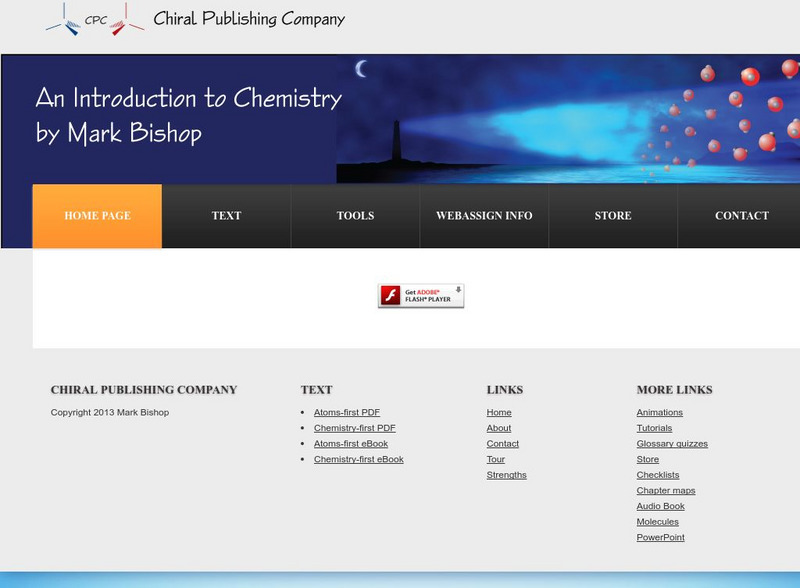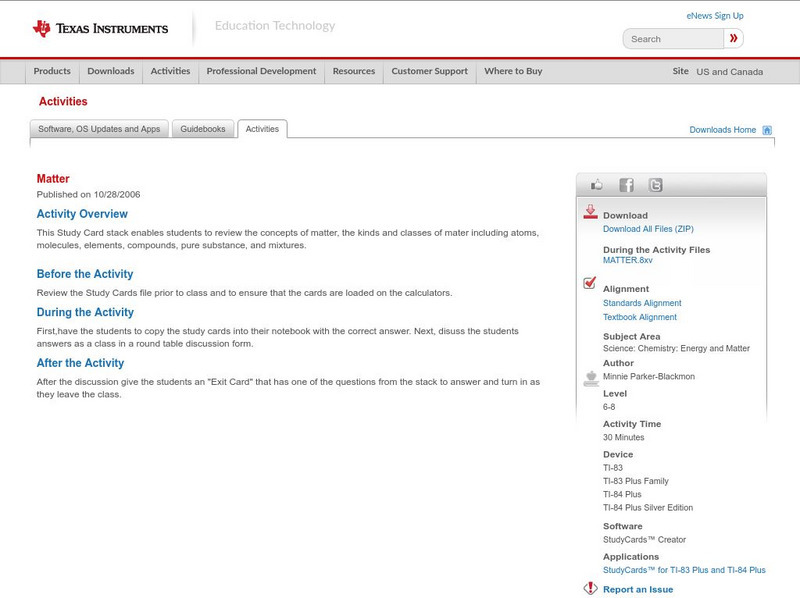Other
Science geek.net: Ions and Compound Formulas
A twenty-question multiple-choice exercise about chemical formulas. Quiz gives immediate feedback with the correct answer.
CK-12 Foundation
Ck 12: Fifth Grade Science: Physical Science: Types of Matter
[Free Registration/Login may be required to access all resource tools.] Discusses elements, atoms, compounds, molecules, and crystals. Looks at mixture and different types of them.
Chiral Publishing
Chiral Publishing: An Introduction to Chemistry: Types of Substances
Practice classifying substances using this fun, interactive exercise. Get either the formulas or names of substances, and decide which type of compound it is.
Other
Science Alive: Synthetic vs. Natural: What's the Difference?
Through this reading, students will learn that a substance's properties arise from its molecular structure, not from how it's made (i.e., synthesized by people or found in nature). There is no fundamental difference between natural and...
Geography 4 kids
Geography4 kids.com: Cycling Phosphorus
An essential element in the ecosystem is phosphorus. Discover the phosphorus cycle, what depends upon it, and how it works.
National Earth Science Teachers Association
Windows to the Universe: Ammonia Nh3
Read about the chemical compound ammonia and learn how it is part of the Nitrogen Cycle.
Science Buddies
Science Buddies: Paper Chromatography: Advanced Version 1
This project will teach you the basics of analytical chemistry, which is a must for students who want to go into chemistry or materials science. The molecules in objects we see all around us are constantly attracting each other....
Other
Virtual Chembook: Density Applications With Gases
DENSITY is a physical property of matter, as each element and compound has a unique density associated with it. Density defined in a qualitative manner as the measure of the relative "heaviness" of objects with a constant volume. For...
Chiral Publishing
Chiral Publishing: An Introduction to Chemistry: Molecular Structures: Olestra
View a 3-D model of olestra, and compare it to a similar structure of a triglyceride. Also see the molecules that make up olestra. All compounds can be manipulated and studied from every angle.
Texas Instruments
Texas Instruments: Matter
This Study Card stack enables students to review the concepts of matter, the kinds and classes of mater including atoms, molecules, elements, compounds, pure substance, and mixtures.
McREL International
Mc Rel: Glue Polymer (Whelmer #15 Learning Activity)
An easy to do activity that investigates the basic principles behind chemical bonding. The activity is written in lesson plan format that meets NSES standards.
Ducksters
Ducksters: Chemistry for Kids: Organic Chemistry
Kids learn about organic chemistry including the importance of carbon, organic molecules, compounds, hydrocarbons, synthesis, and functional groups.






